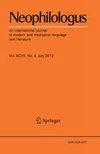帕纳索斯边缘的克韦多诗歌:"musa décima "的评论和注释版本。
IF 0.3
3区 文学
0 LANGUAGE & LINGUISTICS
引用次数: 0
摘要
这篇文章描述了克韦多的 "musa décima"(遗作中未收录的诗歌)的特点,以深化其特征,并考虑未来对整个诗歌进行批判性编辑。由于大量诗歌归属存疑,该诗集的界限仍然模糊不清。在对黄金时代诗歌复杂的传承背景进行简要介绍后,我们将讨论诗歌目录、其文本来源和突出的文学特征:戏谑和反传统、滑稽的诗歌和赞美诗,这些诗歌将作者置于其创作生涯的开端。揭开这本 "边缘 "诗集的面纱将对克韦多的 "核心 "诗歌产生影响。本文章由计算机程序翻译,如有差异,请以英文原文为准。
La poesía de Quevedo al margen del Parnaso: hacia una edición crítica y anotada de la “musa décima”
This article characterises Quevedo's “musa décima”, his poetry not included in the posthumous editions, in order to deepen its features and to consider the future critical edition of the whole. The limits of the corpus are still blurred, due to the abundance of poems of doubtful attribution. After a brief contextualisation in the complex transmission of Golden Age poetry, the catalogue of poems, their textual sources and outstanding literary features are dealt with: jocular matter and antigongorism, burlesque sylvas and poems of praise, which situate the author at the beginning of his career. Unveiling this “peripheral” corpus will have an impact on the “nuclear” poetry of Quevedo.
求助全文
通过发布文献求助,成功后即可免费获取论文全文。
去求助
来源期刊

NEOPHILOLOGUS
Multiple-
CiteScore
0.50
自引率
0.00%
发文量
29
期刊介绍:
Neophilologus is an international peer-reviewed journal devoted to the study of modern and medieval language and literature, including literary theory, comparative literature, philology and textual criticism. The languages of publication are English, French, German and Spanish.
 求助内容:
求助内容: 应助结果提醒方式:
应助结果提醒方式:


